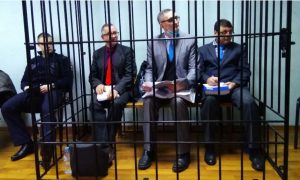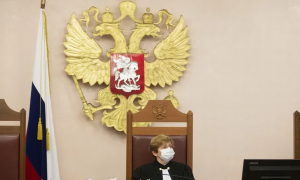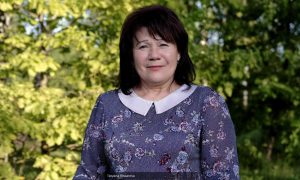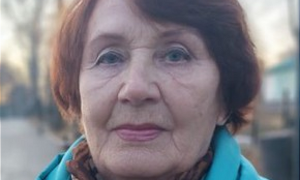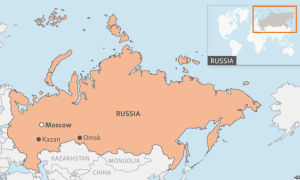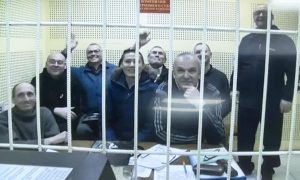| 12 April | |
|---|---|
| 8:00 AM |
Moscow, Cook Street. An invigorating morning. Frozen fingers. At the entrance more than 200 people. Those who are at the beginning of the line came to the court by taxi by 5:30, but they were not the first: in the parked cars, the believers were already basking in the court, in which the freedom of religion in Russia is being decided. |
| 9:30 AM | On the eve, on April 11, 2017, in most groups of Jehovah’s Witnesses the celebration of the Lord’s Supper was successful. At the moment, it is known that policemen and members of other law enforcement agencies have invaded the celebration in Snezhinsk (Chelyabinsk region). They rewrote the passport data of the faithful. Law enforcers also came to the services in Krasnoyarsk and Michurinsk (Tambov region) to ask questions or hand over agendas to believers. |
| 9:58 |
“I ask everyone to stand up!” The court announces the continuation of the hearing and gives the floor to lawyer Anton Omelchenko for giving explanations. Omelchenko said that his explanations will concern how the Justice Ministry’s complaint violates the provisions of the Constitution of the Russian Federation and international treaties. |
| 10:12 | Omelchenko proves loudly and convincingly that the suit of the Ministry of Justice contradicts articles 9, 10, 11 of the European Convention, articles 28, 29, 30 of the Constitution of the Russian Federation, as well as the provisions of the International Covenant on Civil and Political Rights. He quotes from the judgments of the European Court of Human Rights (ECHR), in which the authoritative court establishes the right of Jehovah’s Witnesses to freedom of religion. What the Ministry of Justice requires is not justified and proportionate. |
| 10:18 |
The ECtHR, in its judgments, clearly defined which texts can be considered inciting hatred and enmity – incitement to violence, to blood feud, calls that justify the need for the use of physical force. It is noteworthy that in the memorandum, which the Russian Federation sent to the ECHR, it was the Ministry of Justice that recognized that there are no open calls for violence in the literature of Jehovah’s Witnesses (paragraph 41).
|
| 10:25 | Omelchenko notes that the communities of Jehovah’s Witnesses, which the Justice Ministry requests to liquidate, received many letters of commendation from local authorities (available in the case), but they did not receive any warnings about the inadmissibility of extremist activities. |
| 10:31 | Speaking about the disproportionate measures required by the Ministry of Justice, Omelchenko lists the steps taken by the Jehovah’s Witnesses Management Center: 1) notified all LROs about entering books in the FEMC, 2) created a commission to prevent the appearance of extremist materials, 3) reported ineffectively the authorities about the sublips , 4) unsuccessfully asked the Prosecutor General’s Office what other measures could be expected from Jehovah’s Witnesses to prevent “extremist activity”. |
| 10:43 | International law prohibits inhuman or degrading treatment. This norm protects dignity, including the right of a person’s mental integrity. The Ministry of Justice’s lawsuit on the prohibition of Jehovah’s Witnesses breaks the moral and physical resistance of the individual, forcing them to fear openly professing their faith. Some of the victims of the criminal prosecution for the faith in Taganrog on leaving the court left the Russian Federation and even received political asylum in Europe. Their flight eloquently testifies that believers are afraid to openly profess their religion. Of course, most of the 175,000 believers will not leave Russia, which means they will be persecuted in Russia. |
| 10:50 | Omelchenko analyzes the legality of the actions of the Ministry of Justice. By current legislation, Jehovah’s Witnesses are recognized as victims of political repression. At the Ministry of Justice (among other departments) the law imposes the obligation to promote the rehabilitation of believers. However, the Ministry of Justice is moving in the opposite direction. Omelchenko lists domestic and international appeals to the Russian Federation to stop the politically motivated persecution of Jehovah’s Witnesses, the misuse of anti-extremist legislation in relation to Jehovah’s Witnesses. The case, for example, is about the appeal signed by the most famous Russian human rights activists, “The repressed are again harassed”, the open appeal of the Moscow Helsinki Group, as well as the appeals from various structures in the Organization for Security and Cooperation in Europe, the United Nations, and others. International standards for preventing repression, require that close attention be paid to the signals coming from the human rights community. The Ministry of Justice, while ignoring all incoming signals, continues to act as a repressive body. |
| 11:04 | Omelchenko speaks about the prejudiced position of the Ministry of Justice. Expert institutions under the Ministry of Justice came to mutually exclusive conclusions about the same materials of Jehovah’s Witnesses. The Ministry of Justice did nothing to eliminate this situation. Moreover, the Ministry of Justice has always insisted on applying only those conclusions of experts who found “signs of extremism” in the literature of Jehovah’s Witnesses. This is new evidence that the Ministry of Justice’s claim to ban Jehovah’s Witnesses is politically motivated. |
| 11:12 |
Lawyer Zhenkov asks for an opportunity to give an explanation on the court’s decision, which the Justice Ministry presented to the court a few days ago as “an example of violation of the rights of citizens by a religious organization” (a patient who chose medicament treatment from two alternatives instead of transfusion of donor blood). The lawyer, first, is puzzled over why the Ministry of Justice did not explain where they got the document containing the medical secret. Secondly, Zhenkov says that in case of refusal from transfusion, speech not only does not go about violating anyone’s rights, but, conversely, that the citizen was provided with the right – the right to voluntary informed treatment. If a patient were refused treatment only on religious grounds, this would be a violation of rights. Women read out excerpts from the Order of the Ministry of Health regarding the dangers of transfusion of blood components, as well as the need to receive in advance from the patient a written consent for carrying out this operation. Zhenkov notes that there is no reservation in the Order, that representatives of some religions are allowed to use the right to informed consent, and others are not allowed. |
| 11:30 |
The judge begins to ask questions to the representatives of the defendant. First question: does the JCS give Jehovah’s Witnesses an interpretation of the Bible to local organizations? Answer: no, the interpretation of the sacred texts is provided by the Governing Council of Jehovah’s Witnesses (international leadership). A new question: in what sense does the UC ensure the “coordination of activities” of the LROs (according to the Charter). Answer: LROs are independent legal entities, but the UC provides them with recommendations. For example, if there is a question of building a liturgical building, the UC may, with reference to the Bible, recommend the construction of a modest, unimproved building. However, the final decision on what will be the new building, takes the MPO. The next issue of the court: whether the UC approved the statutes of the 8 MROs that were liquidated by the decisions of the courts. The representative of Topors explains to the court that the founders of the new LROs apply to the CA with a request to enter the UC structure in order to speed up the registration procedure. In this case, the UC unconditionally agrees their statutes to make sure that the founders are Jehovah’s Witnesses and that their mission objectives coincide with the creed of Jehovah’s Witnesses. The court is interested in the question of whether the UC is the founder of non-commercial, public organizations or an MPO, as in the Charter such an opportunity is prescribed. Lawyers explain to the court that the possibility in the Charter is prescribed “just in case”, however it was not realized. The founders of all LROs were local citizens. For example, the statute also provides for the possibility to import literature, but this possibility is also not realized due to objective circumstances. |
| 12:05 |
The court is interested in the question whether the chairmen of the LROs are members of the steering committee of the UC. Kalin explains that MPO members are never part of the steering committee of the CA. Are there decisions of the CA that are mandatory for the LROs? Kalin explains that when the LROs request material assistance from the CA (in the form of donations), the center is interested in the question of how the funds are spent. For example, the UC provides a project for a modest liturgical building, and the LROs coordinate this project with local authorities. Or if a natural disaster occurs, the UC donates funds to help believers and collaborates with the LROs to help the injured Jehovah’s Witnesses, as well as their relatives. The court asks whether the money spent on printing products was spent? Defendants explain that no. The court: Did the UT import literature that was later recognized as extremist? Defendants explain that the function of the CA is purely logistic: an order from individuals is collected directly by a foreign publisher, and it also sends them literature. The UC does not “disseminate” literature. Court: One of the books was imported into Russia shortly before it was recognized as extremist, but when it was distributed among believers? Attorneys pay attention to the letter in the materials of the case, in which the CA immediately informs about the inclusion of this book in the FSEM and requests that it no longer be used. Naturally, after this, the UT could not distribute this book. Court: What is the fate of printing products, which is considered extremist? Is it taken away from the believers? Destroyed? Lawyers explain that the UC can not dictate to believers what to do with the literature that is in their possession. However, he can pay attention to the provisions of the law, and does so. |
| 12:30 |
The queue to ask questions passes to the plaintiff. What is the role of the CA in approving the charters of the LROs and their members? Omelchenko gives the following example. The role of the CA in approving the MPO statutes is similar to the role of the Ministry of Justice itself: the Ministry of Justice verifies the statutes for compliance with the law, and the UC checks the statutes for canonical compliance. New questions from the representative of the Ministry of Justice are devoted to clarifying how independent the LROs are in their activities, how important is the influence of the CA on the LROs, including in the approval of the governing bodies and charters of the LROs. The court asks the representative of the Ministry of Justice a counter clarifying question: “From the point of view of legality, how does this affect the legal capacity and legal personality of legal entities?” The question turns into a rhetorical question. Ministry of Justice: Who are the traveling ministers? Who are the special preachers? Representatives of the defendant explain that these ministers cooperate with religious groups, and not with the LRO. |
| 12:50 |
Judge (addressing the representative of the Ministry of Justice): Does the plaintiff have evidence that the traveling ministers and special preachers are somehow involved in the decisions of the competent authorities that came into force on the recognition of individuals or LROs as guilty of extremist activities? No, the Justice Ministry does not have such facts. The court (referring to the representative of the Ministry of Justice): Does the Ministry of Justice still believe that judicial acts against natural persons and MPOs have a pre-judicial force for our case? Yes, the Justice Ministry still thinks so, because the Center was aware of these cases. The Court recalls that in this process it is necessary to verify the legality of the requirements of the Ministry of Justice, so please continue to bring the norms of the laws. |
| 13:10 | The representative of the Ministry of Justice is trying to find out whether the fact that the UC is providing material assistance to the LRO, or that the UC and the MRO is a single organization subordinated to the CA, is not indicative of the fact. Lawyer Zhenkov explains that if a person provides material assistance to his friend, this does not mean that he is dependent. Ministry of Justice: Does the UC inspect the financial activities of the LROs? Lawyers explain that there is no such duty at the CA, but it is the Ministry of Justice that performs regular inspections of the economic activities of the LRO, as evidenced by hundreds of acts of inspections of the Ministry of Justice that are available in the cases. And none of the inspections revealed the use of funds for non-target purposes. |
| 13:25 | The representative of the Ministry of Justice is interested in the question of why the UC sent a letter to the LRO about recognizing one of the extremist books only after its inclusion in the FEMC, if by their own admission they knew about the decision earlier, from the information on the district court’s website. Lawyers explain that it is extremely difficult to monitor court decisions on official court websites, moreover, it was not clear from the brief information on the court’s website that it was the publication of Jehovah’s Witnesses, and not the same-named publication of a different origin. |
| 13:35 | The representative of the Ministry of Justice draws attention to the fact that, according to the obsolete (until 2010) copies of the “Fundamentals of the Doctrine of the Witnesses of Jehovah”, the main means of disseminating the teachings of Jehovah’s Witnesses is the magazine “Watchtower”. The permission to distribute this periodical was withdrawn in Russia, and the document “Foundations of the Doctrine”, submitted to the Ministry of Justice, was changed accordingly. The representative of the Ministry of Justice is interested in what is the source of the teachings of Jehovah’s Witnesses now. Lawyers explain that the Bible is the basis for the belief of Jehovah’s Witnesses, and most of the Witnesses’ religious books are based on the Orthodox Synodal edition. The periodical itself was not considered extremist, but only a few issues. Since 2015, no publications at all are imported into the country. |
| 13:40 | The court announces a break in the court session until 14:30. |
| 2:30 pm | The representative of the Ministry of Justice continues to ask questions to representatives of Jehovah’s Witnesses. What measures did the UC take to prevent extremist activity after the warning was issued by the Prosecutor General’s Office on March 2, 2016. Lawyers list. The court asks the representative of the Ministry of Justice clarifying questions: If the UC did nothing at all? Would it be a good idea to liquidate them? Is extremism out of carelessness or inaction? Answer of the representative of the Ministry of Justice: No. Court: If not, what are we trying to find out? Why, then, does the Ministry of Justice in general attribute this to the fault of the UC? |
| 14:45 | The Ministry of Justice submits to the court an “internal” document of Jehovah’s Witnesses, received by the Ministry of Justice from open sources. On the clarifying issue of the court, the representative of the Ministry of Justice informs that the letter was taken from the website of NTV. The representative of the Ministry of Justice believes that the text of the letter will help to clarify how the financial departments of the UC and MRO are financially connected. Lawyers are not ready to confirm that such a letter is authentic, but it is already obvious that MPOs are neither recipients nor the sender of the letter, which means the letter has nothing to do with this process. The court postpones for later the question of whether to attach this text to the case materials. |
| 14:58 | The Ministry of Justice solicits interrogation of four witnesses on the part of the plaintiff. It is about people who in the past professed the religion of Jehovah’s Witnesses, but later left it. The respondents object. The court satisfies the petition for interrogation of witnesses by the plaintiff. |
| 15:05 | A questioning of the witness on the part of the defendant begins, Zavyalov Valentin Mikhailovich, since 1992, a professor at MISI. Confesses the religion of Jehovah’s Witnesses for more than 20 years. He reported that at the meetings of his religious group the literature introduced in the FEMC was never used. The names of this literature are posted on the wall of the room where divine services are held. Believers carefully inspect the premises before the start of worship, to exclude the possibility of finding such literature in worship services. |
| 15:20 | Witness Evgeny Skladchikov, Doctor of Technical Sciences, Professor, MSTU. N. Bauman. Became a Witness of Jehovah in 1998. He says that in the religion of Jehovah’s Witnesses he was attracted by the unconditional peaceableness of the biblical teaching, it is completely incompatible with extremism. No extremist publications are used at worship services. |
| 3:30 pm | Witness Vilen Kantere, Doctor of Technical Sciences, Honored Worker of Science and Technology. Representative of the defendant Toporov: “After becoming a Witness of Jehovah 25 years ago, did you pursue extremist goals?” Witness: “God forbid! No, of course! “The witness explains that this is incompatible with the faith of Jehovah’s Witnesses. Axes: “Do you use the materials included in the FSEM?” The witness explains that, as a law-abiding citizen, he destroyed these publications. (However, Kantere says that he leaves aside the question of whether he agrees that these publications have been made to the FSEM.) Dozens of his students defended candidate and doctoral dissertations. His religion does not contradict his scientific activity. Asked by the representative of the Ministry of Justice, he explains that his religion does not hinder the receipt of higher education. As a scientific worker, he believes that education must be treated responsibly. |
| 15:50 | Witness Tatiana Kremneva, doctor of pedagogical sciences. As part of his scientific work, he is involved in the prevention of child abuse and extremist materials in the youth environment. Confesses the religion of Jehovah’s Witnesses. Representative of the Axes: When you became a Witness of Jehovah, did you become motivated to commit extremist acts? Answer: No, the religion of Jehovah’s Witnesses is incompatible with extremism. Question of the court: why did not you become the founder of the LRO? Witness: I do not see the need. Trial: Do you excite discord in other religions in other religions? Witness: No. Advocate Zhenkov: Did the Teaching of Jehovah’s Witnesses help you raise a child? The witness tells that he is proud of his child, his success in studies and work. Zhenkov: how do you feel about colleagues and students who do not share your religion? Witness’s response: Positively. Without hatred, disrespect, contempt, discrimination. |
| 16:05 | The Ministry of Justice invites its witnesses. First witness Natalia Koretskaya. The witness left the religion of Jehovah’s Witnesses many years ago. She can not explain to the court, where she could in that case be known “facts of extremist activity” of recent years. |
| 16:54 |
Interrogating witness Koretsky, the court drew attention to the fact that she uses personal records while giving evidence. Lawyer Omelchenko asked how to explain the similarity of the formulations from her notes with texts from the site of the well-known anti-sectarian center. The court decided to read Koretsky’s notes later. The examination of the witnesses of the Ministry of Justice continues. The testimony is given by a former Jehovah’s Witness, Pavel Zverev. |
| 18:11 |
Interrogating witness Zverev, the court is interested: “If you are harmed, did you contact the competent authorities on this matter?” The witness did not apply. Zverev said that under the influence of the literature of Jehovah’s Witnesses he personally felt hatred for the clergy of the Orthodox religion. The witness denies that he is in anti-cult organizations, although he met and photographed with the most famous “sectologist”. Witness of the Ministry of Justice Petrova, a former Jehovah’s Witness. In 1983, when she became Jehovah’s Witness, she left her work connected with the propaganda of military heroism, because this does not correspond to the belief of Jehovah’s Witnesses. In 2009, she left the religion of Jehovah’s Witnesses. As an example of the extremist activities of the Management Center, the witness cites the fact that Jehovah’s Witnesses exclude those who commit sins from their ranks. (The court asked the representative of the Ministry of Justice what are the arguments of the Justice Ministry, confirmed in the testimony of this witness?) The Ministry of Justice again speaks about a possible threat to an uncertain circle of persons.) On the question of the court, whether witness Petrov saw that someone spread extremist literature, a witness Replies that she did not see. The court invites the last witness of the Ministry of Justice, V.Koretsky. |
| 18:30 |
In 2009, Koretsky left the ranks of Jehovah’s Witnesses. The judge asks if his knowledge of Jehovah’s Witnesses is limited in 2009. Witness: yes. The Ministry of Justice asks the witness to explain that he knows about the attitude of Jehovah’s Witnesses to higher education, to state symbols. The court asks the representative of the Ministry of Justice: “If you do not specify these points in the grounds of the claim, why do we need to find out?” The representative of the Ministry of Justice: “The question is removed.” On the question of the court whether Koretsky is interested in the outcome of the case, he answers briefly: “Yes.” The court announces a break until April 19, 2017 10:00. |
- Saturday
- May 4th, 2024
 Â
 